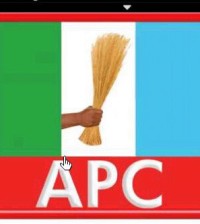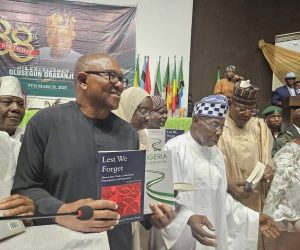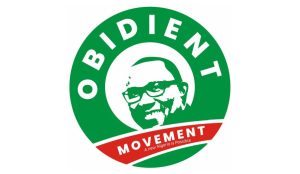Opinion: Is This The Beginning Of The End Of APC? By – JIDE OJO

The All Progressives Congress commenced election of new party executive members with the Ward Congress held last Saturday, May 5, 2018 across the country. Unfortunately, the party whose motto is Justice, Peace and Unity ended up with an exercise that was marred by widespread violence, alleged imposition of candidates, holding of parallel congresses, confusion and controversies. What happened last Saturday gave credence to the initial resolution of the party on February 27, 2018 when the National Executive Committee of the APC decided to extend the tenure of the current executives by a year, beginning from June 2018.
It took the intervention of President Muhammadu Buhari who asked the party to rescind that decision because it was illegal and unconstitutional before the party agreed to have elective congresses and convention. Initially, the party had scheduled the Ward Congresses for Wednesday, May 2, 2018; Local Government Congresses for Saturday, May 5, 2018; State Congresses for Wednesday, May 9, 2018 and National Convention, for Monday, May 14, 2018. However, it later postponed the convention till June while rescheduling the congresses to May 5, 12 and 19 for Ward, Local Government and State elective congresses respectively.
The whole essence of the party congresses was to elect new party executives that will pilot the affairs of the party for the next four years as well as elect delegates for the national convention. Unfortunately, power tussles among the different interest groups in the party robbed the Ward Congress held last Saturday of any legitimacy. There were reported cases of violence. For instance, in Delta State, a chairmanship aspirant for the APC in Jeremi Ward 10 (III), Ughelli South Local Government Area of Delta State, Mr. Jeremiah Oghoveta, was reportedly stabbed to death. There were also reported cases of violence in Oyo, Rivers, Taraba, Anambra, Ondo, and Imo states. In some others like Adamawa, Imo and Ebonyi, parallel Ward Congresses were allegedly held. Among the issues raised Saturday’s APC Ward Congress include hoarding of nomination forms, election by affirmation or consensus rather than by election, diversion of voting materials, imposition of candidates, late commencement of voting and vote buying.
The APC spokesperson, Mallam Bolaji Abdullahi, in a statement issued on Sunday, May 6, 2018, described the Ward Congress as “generally peaceful” even as he acknowledged that there were some issues arising from the conduct of the election in some states. According to him, “With this in view, the party had set up various appeal committees which will begin sitting from Monday, May 7, 2018. We therefore call on all party members to remain law abiding and where there are issues, they should seek redress through the appeal committees in their respective states.”
While the Ward Congress was underway last Saturday, another epochal event was taking place in Ekiti State. It was the APC primary to elect the party torch bearer in the state’s July 14, 2018 governorship election. Unfortunately, that exercise too was enmeshed in a swirling controversy that led to its indefinite suspension. Reports had it that some hoodlums with sympathy for some of the 33 aspirants disrupted the voting when they perceived that some of the delegates, especially the uneducated ones among them, were receiving instructions from an agent of one of the aspirants on whom to vote for. It was alleged that the agent was taking down the serial numbers of the ballot papers of the delegates with a view to purportedly pay them later for their votes.
It was also alleged that the secretary of the election committee was a business partner and a friend of the same aspirant whose agent was allegedly influencing the delegates’ choice. Here is what Segun Oni, one of the aspirants said to the press on the unfortunate incident: “How would one feel to get to the field of play and find out that the referee was nominated by one of the teams? We found out that the secretary of the committee, Aliyu Mogaji, was nominated by an aspirant and Governor Tanko Al-Makura later got to know about this and dropped him from functioning as the returning officer. Even the fraud festered to the ranks of the security agencies. I quite appreciate the fact that violence was not the right way, but it was caused by anger.”
Many a time when the APC gloat over the People’s Democratic Party and blame the party for all of the woes in our body polity, one is quick to say that it has no moral justification to pontificate and call the PDP names. Both parties are copying from the same textbook. In 2014, ahead of the party congresses and convention, the APC governors and a prominent leader of the party allegedly colluded to give the exercises a predetermined outcome. As it was in 2014, so it is now in the APC.
President Buhari was quite concerned with the growing disaffection within the party that he set up the Bola Tinubu-led national reconciliation committee on February 6, 2018. The committee obviously has achieved limited success since it was initiated. This may not be unconnected with the fact that Tinubu himself is among the aggrieved party members having openly called for the resignation or removal of the incumbent party chairman, Chief John Odigie-Oyegun. In a February 21, 2018, letter to the APC chairman which was copied to the President, Tinubu accused Odigie-Oyegun of seeking to undermine the mandate given to him by the President to reconcile aggrieved members and ensure party cohesion by engaging in some “dilatory tactics.” His words: “Drawing from your behaviour in Kogi, Kaduna and with regard to the state chapter assessment requested, I am led to the inference that you have no intention of actually supporting my assignment. Instead, you apparently seek to undermine my mandate by engaging in dilatory tactics for the most part.”
With what happened during the Ward Congress and party primary in Ekiti, are we seeing the beginning of the end of the APC? Time will tell. However, it is in the best interest of the ruling party to correct its past mistakes rather than continue to live in denial. It is on the brink of collapse because of too much vested interests among its many power brokers especially the governors, ministers, senators, House of Representatives members and the major party financiers. It is a legitimate ambition to contest and win elections but such should not be earned through underhand tactics and sharp practices. Internal party democracy should not be sacrificed at the altar of political interest. If the APC will survive the brewing crisis, it must embrace equity, justice and fair play in its party affairs. Punch





